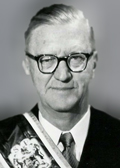 |
Charles Robberts Swart
b. 5 Dec 1894, Morgenzon, Winburg District, Orange Free State
d. 16 Jul 1982, Bloemfontein, Republic of South Africa |
| Title: |
Governor-General of the Union of South Africa :: Goewerneur-Generaal van die Unie van Suid-Afrika |
| Term: |
12 Jan 1960 - 1 May 1961 |
| Chronology: |
12 Dec 1959,
appointed by Commission under the Royal Sign Manual and Signet of the Union of South Africa [1] |
| |
12 Jan 1960,
Commission takes effect upon a date prescribed for superseding the Commission of a predecessor (12 Jan 1960) [1] |
| |
12 Jan 1960, made an affirmation of allegiance and an affirmation of office as Governor-General of the Union of South Africa, Cape Town [2] |
| |
1 May 1961, appointment terminated [3] |
| Names/titles: |
State President of the Republic of South Africa :: Staatspresident van die Republiek van Suid-Afrika (31 May 1961 - 1 Jun 1967) (see details) |
| Biography: |
| Born in the district of Winburg, Orange Free State, of an Afrikaans farming family; spent part of his early childhood during the Boer War in a British concentration camp; matriculated at the age of 13 from Winburg High School; at the age of fifteen, he was appointed magistrate's clerk at Winburg; studied in the Grey University College (University of the Orange Free State), obtaining a bachelor's degree in 1912; worked as a schoolteacher at Ficksburg (1914-1915); joined the National Party (Nasionale Party) in 1914; was incarcerated for a week after being arrested on a charge of espionage at the time of the 1914 Rebellion following South Africa's declaration of war against Germany; served as secretary of the examination board of the Orange Free State Education Department (1915-1918); earned a degree in law and was admitted to the bar (1918); practised as an advocate of the Supreme Court in Bloemfontain and lectured part-time at the Grey University College and Glen Agricultural College (1919-1948); became chief secretary of the National Party in the Orange Free State (1919-1928); studied in the University of Columbia in the United States (1918-1921); elected to the House of Assembly of the Union of South Africa, representing Ladybrand (1923-1938); opposed the merger of the National Party with the South African Party (1934); split with the National Party and joined the Purified National Party (Gesuiwerde Nationale Party, GNP) under Daniel François Malan; was elected to the Federal Council of the GNP in 1935; participated in the Afrikaner Broederbond, a secret organization dedicated to the advancement of Afrikaner interests; was a member of the GNP's liaison committee that led to the formation of the Reunited National Party (Herenigde Nasionale Party, HNP; from 1951 Nasionale Party) in 1940; served as Leader of the HNP (and later Nasionale Party) in the Free State (1940-1959); again elected to the House of Assembly for the seat of Winburg (1941-1959); served as minister of justice (1948-1959) and minister of education, arts and science (1949-1950) in the cabinet of Malan; between 1948 and 1959 he acted in several other positions, such as Leader of the House of Assembly (1954-1959); during the illness and eventual death of Prime Minister Johannes Gerhardus Strijdom he, being the the most senior minister, supervised the activities of the government and was entrusted with the administration of the Department of the Prime Minister (25 Aug 1958 - 3 Sep 1958); served as Governor-General of the Union of South Africa (12 Jan 1960 - 1 May 1961); a staunch believer in Afrikaner nationalism, he was elected the first State President of the Republic of South Africa (31 May 1961 - 31 May 1967); his retirement from the office was announced 7 Nov 1966 (effective 31 May 1967); in 1967 he retired to his farm De Aap in the Brandfort district where he lived until his death in 1982. |
| Biographical sources: "New Dictionary of South African Biography", ed. by E.J. Verwey (Pretoria: HSRC, 1995), 1:236-240; obituary: Rand Daily Mail, 17 Jul 1982, pp. 1, 5. |
| |
| [1] |
Government Gazette, No. 6348, Extra, 12 Jan 1960, p. (2). |
| [2] |
Government Gazette, No. 6348, Extra, 12 Jan 1960, p. (1). |
| [3] |
Rand Daily Mail, 1 May 1961, p. 1; details of the resignation are discussed in "The New Constitution" by Ellison Kahn, in The South African Law Journal, vol. LXXVIII (part I), 1961, pp. 248-249. |

